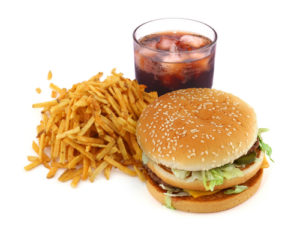 Ultra-processed foods are linked to many health harms, including heart disease and type 2 diabetes. A recent large study of women found that they are also linked to colon adenomas (polyps) - which are precursors to colorectal cancer. The more ultra-processed foods in the diet, the higher the risk of polyps (adenomas).
Ultra-processed foods are linked to many health harms, including heart disease and type 2 diabetes. A recent large study of women found that they are also linked to colon adenomas (polyps) - which are precursors to colorectal cancer. The more ultra-processed foods in the diet, the higher the risk of polyps (adenomas).
There was a 45% greater risk of polyps in the group eating the most ultra-processed foods (about 10 servings per day), when compared to those eating the fewest ultra-processed foods (about 3 servings per day).
The researchers point out that the rise in the rates of colorectal cancer has occurred with the rise of ultra-processed food consumption. Currently, more than 50% of the diet of Americans consists of ultra-processed foods.
Other researchers suggest that there may be other contributing factors to the rise in colorectal cancer, such as low fiber in the diet (typical Western diet), and microplastics in the environment, which are found in our food, water, and beverages.
Bottom line: Eat a diet rich in whole grains, fruits, vegetables, nuts, seeds, and legumes. This will increase the amount of fiber in your diet, and lower your intake of ultra-processed foods. Read ingredient labels and if there is something that normally is not found in a person's kitchen, then it is ultra-processed.
Examples of ingredients found in ultra-processed foods: emulsifiers, carrageenan, mono- and diglycerides, soy lecithin, polysorbate, cellulose, colors, titanium dioxide, high fructose corn syrup, hydrogenated oils, dextrose, whey protein, nitrates, artificial flavors, natural flavors, colors, etc.
From Medical Xpress: Ultra-processed foods tied to higher rates of early-onset colorectal cancer precursors in adults
Colorectal cancer used to be associated with old age, but diagnoses have become increasingly common in adults aged 50 or younger particularly in high-income countries like the United States. The reason for this trend is unclear, but a new study led by Mass General Brigham researchers, as part of the Cancer Grand Challenges PROSPECT team, suggests an important link to ultra-processed foods that merits closer investigation. ...continue reading "Ultra-Processed Foods and Colon Polyps"
